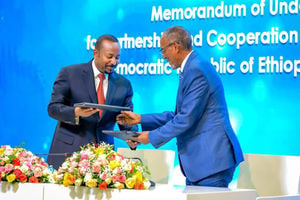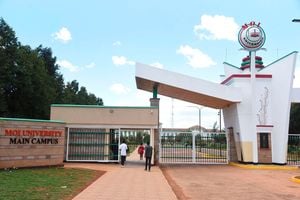
President William Ruto with National Intelligence Service Director- General Noordin Haji when he awarded charters to the Islamic University of Kenya and National Intelligence and Research University at State House, Nairobi, on November 5, 2024
Intelligence agencies and the security sector in most countries – including the most advanced democracies – have been shrouded in opacity. Part of that secrecy is of course justified, but much of it isn’t. There are state secrets that must be guarded and hidden from the public’s view. That’s why classification of government documents and information exists.
In a democracy, there ought to be a high degree of convergence between what the public interest demands, and what the state does to ensure its perpetuity. Security and democracy must live as two vital limbs of the same body. For that to happen, security must become a labour of the intellect. That’s why the National Intelligence Research University (NIRU) is a welcome development.
Not too long ago, national intelligence services lived under cloak and dagger. Even in the United States, in my view the most transparent democracy in the world, security agencies have often operated in the shadows until recently. They still do to some extent, but the public through the dictates of democracy and the Congress knows more today than it did before. Just remember how Americans were lied to by the Kennedy, Johnson, and the Nixon Administrations about the Vietnam War. Or even the dastardly actions of the CIA, FBI, and other US security agencies in the wake of the September 11, 2001 terrorist attacks. But with technology and now AI, the public can find out about untoward government actions.
Security agencies
There recently has been a sea change in the opacity of security agencies. I remember a time when the bosses of the CIA, MI6, and Mossad, and even Kenya’s NIS and its predecessors, were shadowy characters not really known to the public. That’s now changing, and I hasten to add that more is needed. In Kenya, the NIS under current Director General Noordin Haji, has become more public facing. There have been a number of academic and policy conferences in which scholars, civil society actors, and “outsiders” – folks who would’ve been generally regarded as unwelcome – have graced those discussions and offered unvarnished analyses. I can’t overstate how important this openness is to a democracy and its legitimacy.
But transparency isn’t enough. The NIS needs to enhance its intellectual capacity and become a thought leader in matters of security not just in Kenya but in the region. That’s where NIRU comes in and why it’s a very timely institution. If we admit the theory of the case that security is the nerve centre of the state – and the institution that’s responsible for the survival of the state and its democratic institutions – then NIRU needs to become a leading research university and think tank. In keeping with the core values of academic freedom, NIRU must mimic the intellectual traditions of the best universities in the world. Let’s discuss some of those traditions that must become anchor pillars of NIRU.
First, NIRU should have academic and institutional independence from NIS. This is the core of a great university. This will require the adoption of academic and administrative policies that shield NIRU from political interference. Academics, professors, and students in a university can’t look over their shoulder while in the classrooms. Truth and academic honesty die in the darkness of political calculations. This isn’t to say that NIRU isn’t anchored by NIS but it’s to say that NIS must, of academic necessity, allow NIRU to function as a university. That’s the only way NIRU will attract top notch scholars and deliver top-flight scholarship on national security. The best academics are those unafraid of retaliation and retribution by people in power.
Resilient democracy
Second, NIRU must pioneer a robust and futuristic curriculum on current and foreseeable threats, opportunities, and challenges to Kenya, the region, and the planet. This must include solid courses on democracy and state building. How does Kenya create a resilient democracy that will maximise the happiness of our citizens? Ultimately, only a legitimate state that’s in sync with the public can make Kenya a truly irreversible nation, and not the nation in embryo that it is. These courses must demystify security as the purview and concern of only spooks who live under cover. No – security must be the business of every citizen. How does Kenya address climate science, armed non-state actors, threats to the economy, and public disaffection?
Finally, NIRU must strive to produce the most qualified cadres for the intelligence community and public service. It must lead the country in creating a nation with intelligence literacy. The officers it trains must be steeped in the rule of law, the remit of state action, and incubate the desirability in our young people for a career in intelligence. A career in intelligence need not be a dirty word or something to hide from relatives and friends. Intelligence officers are our relatives and they should feel proud of their service to the nation. NIRU can help Kenya integrate intelligence work into the lives of everyday citizens.
Prof Mutua is SUNY Distinguished Professor and Margaret W. Wong Professor at Buffalo Law School, The State University of New York. @makaumutua.









